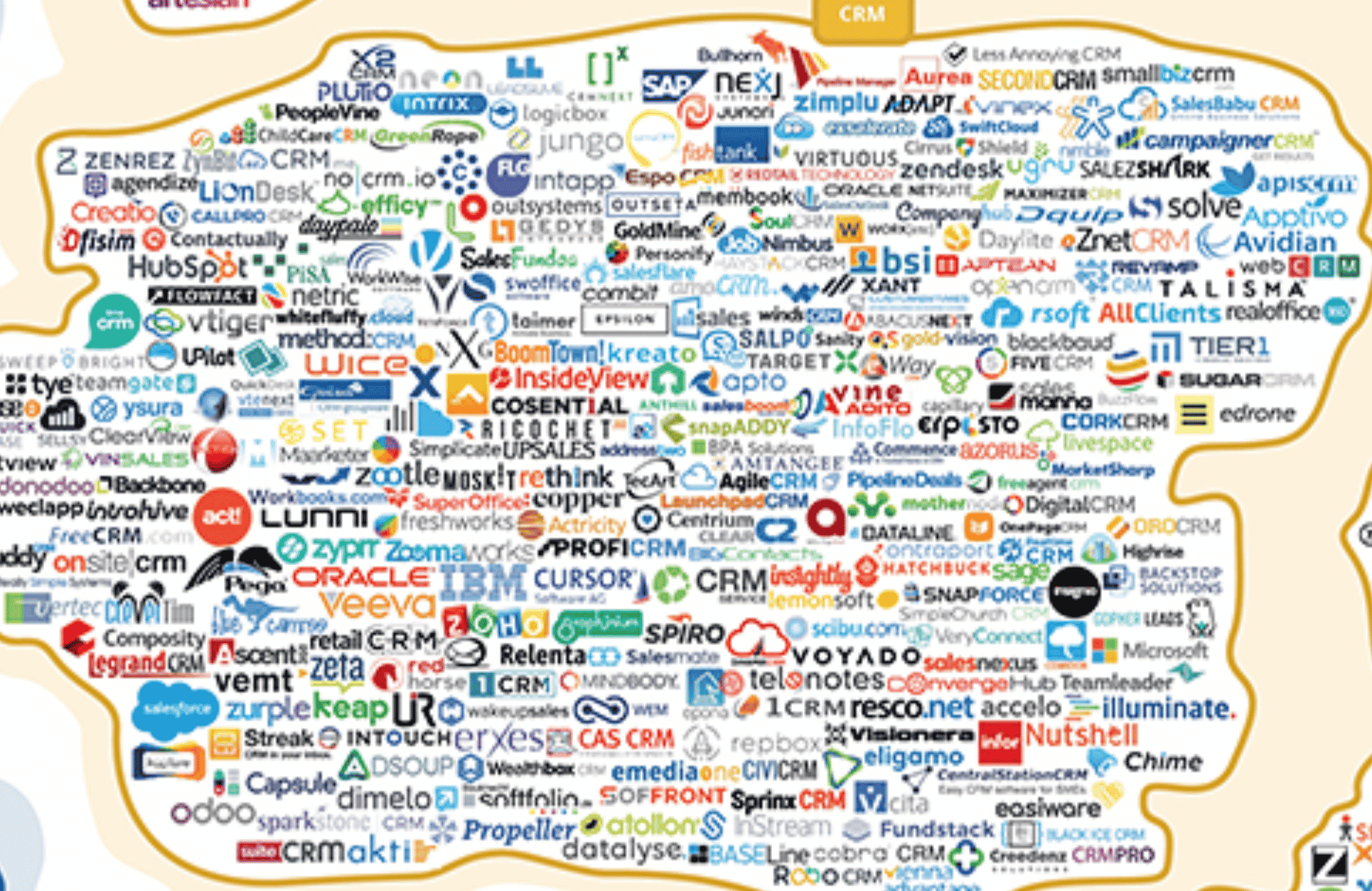
Content Marketing Analysis: How to Win The CRM SaaS Market
Managing customer relationships has always been super important to the success of a business.
For many product and service companies, it is an evolution. It starts with defining product-market fit. Then we have to hire and scale sales and marketing pipeline to acquire new customers. And it culminates in servicing and retaining existing customers to maximize profit.
For nearly 40 years, Customer Relationship Management (CRM) has been software-based and data-driven. Companies have embarked on a content-based B2B digital marketing strategy in order to find, win, and retain new clients.
By using data, tools, and research, we’re going to conduct a content marketing analysis of various business software segments. We started this series of content marketing analyses with Master Data Management. Now we’re bringing it closer to our sales and marketing roots with a look into the content marketing performance of the top CRM platforms.
We’ve helped companies build a content marketing strategy in just about every industry there is. We provide simple content roadmaps. When clients follow the guidelines presented, amazing results follow.
Stick around to learn more about how the key players in the CRM game are able to attract visitors to their website using content marketing. (And if you want an analysis like this for your industry, let me know!)
What is CRM and Why Is It Important?
I remember using ACT! software to manage my contacts way back in 1994 when I started in sales. For me it was mainly a data management tool.
Today, SaaS-based CRM platforms manage both the people involved as well as many of the tasks surrounding customer data, campaigns, lead states, pipeline value, and contract stages.
If you have any processes for sales, marketing, business development or customer service, then you likely use one of the CRM platforms.
An effective CRM tool provides real-time data, trustworthy reporting, enhanced automation, and overall increased productivity.
Simply put, the market potential is huge. And the landscape is crowded. Here is a snapshot from Scott Brinker’s martech landscape 2020 displaying just the all the CRM software companies.
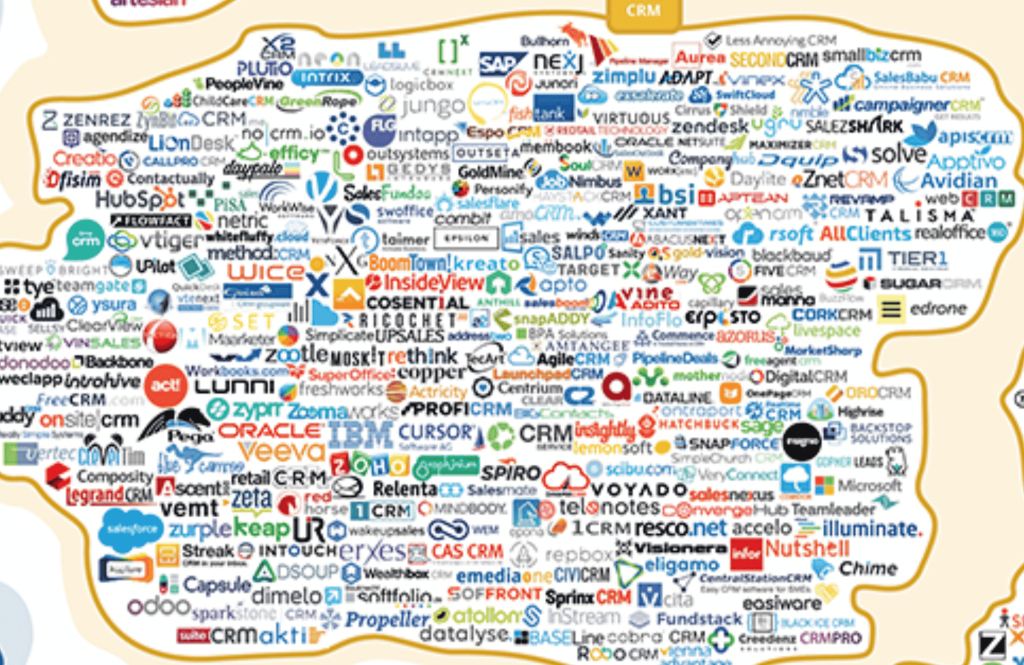
Ahh Competition: Why CRM Companies Focus on Content Marketing?
The above image makes it clear. CRM software is one of the oldest and most competitive martech segments there is.
Lead nurturing, sales, marketing, support and service, all play a role in CRM. Messaging and engaging customers at every touchpoint along their customer journey is paramount today. Mapping content to each stage of the funnel is the right way to do it. This works even when the funnel is inverted (ABM).
All you have to do is look at Salesforce.com, arguably the first successful SaaS tool. Despite being a market leader, Salesforce has been one of my favorite examples of effective content marketing for years because they answer basic buyer questions with consistent and helpful content.

Salesforce has owned the #1 ranking for “what is CRM software” for more than 20 years:
Customer relationship management is any tool, strategy, or process that helps businesses better organize and access customer data.
And they created one of the most successful infographics in martech to explain what CRM is.
Why This Report Is Useful to All CRM Companies
This report can help CRM companies better understand their own competitive advantages in the market, and what the winners are doing differently.
By the end of the report, our goal is for each CRM company to understand their stance in the industry and what they could do to improve their awareness, search rankings, website traffic, and leads derived from their website.
New and smaller entrants to a saturated market can in fact build competitive advantage with these strategies. As we’ve proven time and time again, no company is too small or too new to become a destination of insights in their industry.
The bottom line is that B2B buyers get most of their information from searching online. And this trend has accelerated since the pandemic. This makes content marketing an instrumental part in reaching, engaging, and converting those buyers.
Methodology
Here’s how we approached our content marketing analysis for the CRM software segment:
- Identified top companies based on software reviews and analyst reports
- Chose major players whose strategy is clear and easy to understand
- Checked the performance of their websites against key metrics to gauge search visibility
Introducing the Top- CRM Software Companies
Here are the top CRM software companies and how they describe themselves on their websites:
- Salesforce – Salesforce is the world’s #1 customer relationship management (CRM) platform. We help your marketing, sales, commerce, service and IT teams work as one from anywhere — so you can keep your customers happy everywhere.
- HubSpot – HubSpot offers a complete CRM platform with all the tools and integrations you need to grow better — whether you want to increase leads, accelerate sales, streamline customer service, or build a powerful website.
- Zoho – Zoho CRM empowers a global network of over 150,000 businesses in 180 countries to convert more leads, engage with customers, and grow their revenue.
- Zendesk – Zendesk makes support, sales, and customer engagement software for everyone. It’s quick to implement, easy to use, and scales to fit your needs.
- Freshworks – With Freshworks CRM, discover the best leads, boost customer engagement, drive deals to closure, and nurture existing customers with a smart, comprehensive solution.
- Pipedrive – When you need to stay laser-focused on the right deals, Pipedrive is here to support you.
- Nimble – Skip the set-up. Nimble is the only CRM that builds itself for you.
- Less Annoying CRM – A simple CRM built just for small businesses to track leads and stay on top of follow-ups
- SugarCRM – SugarCRM empowers your marketing, sales and services teams to collaborate across the entire customer lifecycle for more meaningful, memorable experiences.
- Monday.com – One platform. Better Teamwork. Highly effective teams choose monday.com to manage their work.
- ActiveCampaign – ActiveCampaign gives you the email marketing, marketing automation, and CRM tools you need to create incredible customer experiences.
- Keap – Wish you had eight arms? Us too. Keap’s CRM and sales and marketing tools help you get more done with less work so you can grow your business.
- Insightly – The Unified CRM Platform – Align Marketing, Sales, and Project teams around one view of your customers.
- LeadSquared – Get higher efficiency out of your call center, feet-on-street, digital sales and merchant operations
- Microsoft Dynamics 365 – Meet today’s challenges by bringing your customers and business together with the next generation of CRM and ERP applications.
- Nutshell – The CRM that just works – Choose the sales model that best fits your business and see how we help teams like yours close more deals.
Overall Domain Authority and Organic Traffic
When we look at overall domain authority, traffic and backlinks, Salesforce, HubSpot, Zoho and Zendesk take the lead.
The one key differentiator is their paid budgets: $1.8M, $170K, $358, and $823.4K, respectively.
Microsoft Dynamics leads in authority score with a 93, largely due to their consumer software parent.
Nutshell, LeadSquared and Less Annoying CRM come in last, respectively in domain authority and organic traffic.
| Site | Authority Score | Organic Traffic | Keywords | Backlinks | Domains | Paid Keywords | Paid Costs |
| salesforce.com | 81 | 8.5M | 2.27M | 33.9M | 151.5K | 36.8K | $1.8M |
| HubSpot.com | 80 | 15.8M | 4.12M | 137.8M | 219.4K | 1.4K | $170K |
| Zoho.com | 77 | 4.4M | 1.16M | 22M | 126K | 342 | $358 |
| Zendesk.com | 87 | 9.7M | 6.87M | 750.9M | 265.6K | 16.1K | $823.4K |
| Freshworks.com | 68 | 265.2K | 155.7K | 3.2M | 16.1K | 9.4K | $809.6K |
| Pipedrive.com | 63 | 477.1K | 169.5K | 829.5K | 10.8K | 12.7K | $384.1K |
| Nimble.com | 59 | 85.9k | 31.1k | 531.6k | 5.3K | N/A | N/A |
| LessAnnoyingCRM.com | 45 | 15.2K | 14.9K | 16.3K | 1.3K | 9 | $2.5K |
| SugarCRM.com | 65 | 93.9K | 71.4K | 1.2M | 15.4K | N/A | N/A |
| Monday.com | 63 | 709K | 152K | 551.7K | 12.9K | 48K | $2.8M |
| ActiveCampaign.com | 68 | 359.6K | 201.7K | 2.9M | 26.4K | 13.2K | $763.8K |
| Keap.com | 57 | 159.1K | 102.2K | 264.6K | 6.5K | 651 | $87.2K |
| Insightly.com | 60 | 44.8K | 9.5K | 166.7K | 6K | 1.1K | $86.9K |
| LeadSquared.com | 53 | 104K | 30K | 25.5K | 2.3K | 150 | $4.6K |
| Dynamics.microsoft.com | 93 | 636.3K | 43.7K | 434.3K | 9.5K | 16.2K | $448.6K |
| Nutshell.com | 52 | 79.3K | 54.4K | 191.7K | 2.6K | 99 | $7.2K |
Which CRM Software Companies Lead in Terms of Web Traffic?
In order to measure the value of each visitor, it’s important to understand the differences between each traffic source. Traffic sources can be categorized into direct, email, organic, paid, referral or social.
The average technology website gets 45% of it’s traffic from organic search, 38% from direct traffic (visitors typing the company website name into their browser), 15% from referral traffic (other websites linking to the company) and just 1% from social media.
It’s interesting to note that all but 3 of these leading CRM companies get less than average traffic from organic search on a percentage basis.
In order to acquire new customers, a company must attract new visitors to their website. To determine the success of a company at attracting visitors who don’t already know who they are (direct traffic) without having to for it (paid traffic), we look primarily at organic search while considering referral and social media traffic as well. This is why SaaS Content Marketing provides such high ROI.
In the CRM category, Dynamics.Microsoft.com, Nutshell.com, and SugarCRM.com are listed at the top of the organic search traffic chart based on percentage at around 54-57%. Monday.com, Salesforce.com and Leadsquared.com are at the bottom of this list with only around 6-8% of their traffic coming from organic.
There’s multiple factors at work here.
For example, because of their lack of name recognition, organic search, and referral traffic compared to the category leaders Salesforce and Hubspot, Monday appears to be using paid to grow more than any other company:
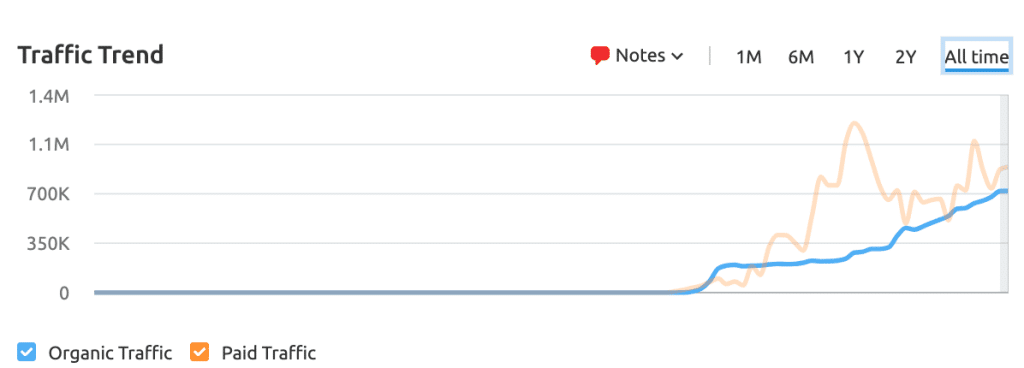
I would question how sustainable this strategy is?
LeadSquared seems to be relying on word of mouth over organic or paid, with more than 8% of their traffic coming social (more than 5x their peer average.) However, the trend in website traffic from social is decidedly downward.
This is why we focus on delivering gains in organic search. You are attracting relevant visitors to your website while they are looking for education on a problem you solve. The cost per acquisition is lower in organic than in paid (about 10x lower for our clients). And the cost per “effort” is lower for organic vs social or campaigns.
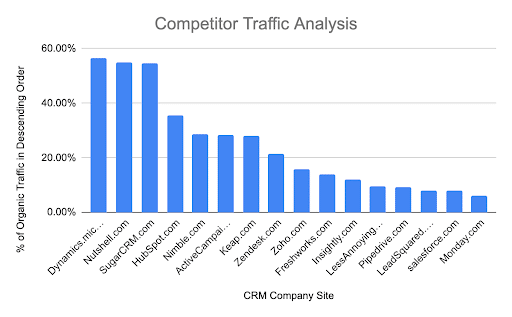
Source: SEMrush
| Company Name | Other Traffic |
| Monday.com | Direct: (76.83%) Referral: (4.58%) Paid: (5.71%) Social: (6.66%) |
| Salesforce.com | Direct: (35.68%) Referral: (55.86%) Paid: (.25%) Social: (.30%) |
| LeadSquared.com | Direct: (78.38%) Referral: (13.49%) Paid: (.07%) Social: (8.06%) |
| Pipedrive.com | Direct: (84.64%) Referral: (3.36%) Paid: (2.65%) Social: (.23%) |
| LessAnnoyingCRM.com | Direct: (88.18%) Referral: (2.01%) Paid: (.09%) Social: (.16%) |
| Insightly.com | Direct: (67.07%) Referral: (18.63%) Paid: (1.98%) Social: (.11%) |
| Freshworks.com | Direct: (29.98%) Referral: (51.62%) Paid: (3.61%) Social: (.79%) |
| Zoho.com | Direct: (68.31%) Referral: (14.98%) Paid: (.34%) Social: (.46%) |
| Zendesk.com | Direct: (47.64%) Referral: (29.48%) Paid: (.10%) Social: (1.26%) |
| Keap.com | Direct: (55.22%) Referral: (8.82%) Paid: (4.48%) Social: (3.58%) |
| ActiveCampaign.com | Direct: (53.08%) Referral: (12.22%) Paid: (5.58%) Social: (.74%) |
| Nimble.com | Direct: (67.86%) Referral: (3.37%) Paid: (0%) Social: (.15%) |
| HubSpot.com | Direct: (51.85%) Referral: (11.36%) Paid: (0.32%) Social: (.84%) |
| SugarCRM.com | Direct: (21.76%) Referral: (18.35%) Paid: (4.56%) Social: (.57%) |
| Nutshell.com | Direct: (39.70%) Referral: (4.70%) Paid: (0.23%) Social: (0.41%) |
| Dynamics.microsoft.com | Direct: (18.67%) Referral: (20.51%) Paid: (3.77%) Social: (0.37%) |
Source: SEMrush
What Are CRM Software Buyers Searching For?
In SEMRush, our team searched each of the key players using the key term “customer relationship management.” These trending subtopics show the most popular subtopics over the last 60 days across the internet.
To break it down further, this demonstrates the current growth potential on these particular subtopics and could be a great trend for your business to follow.
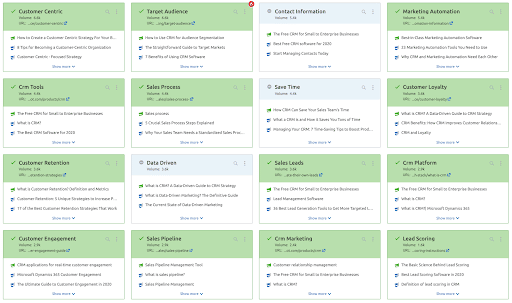
The mind map visualization below shows the keywords and questions these potential customers are using when they search the internet for answers. This could serve as the starting point for an annual content marketing plan.
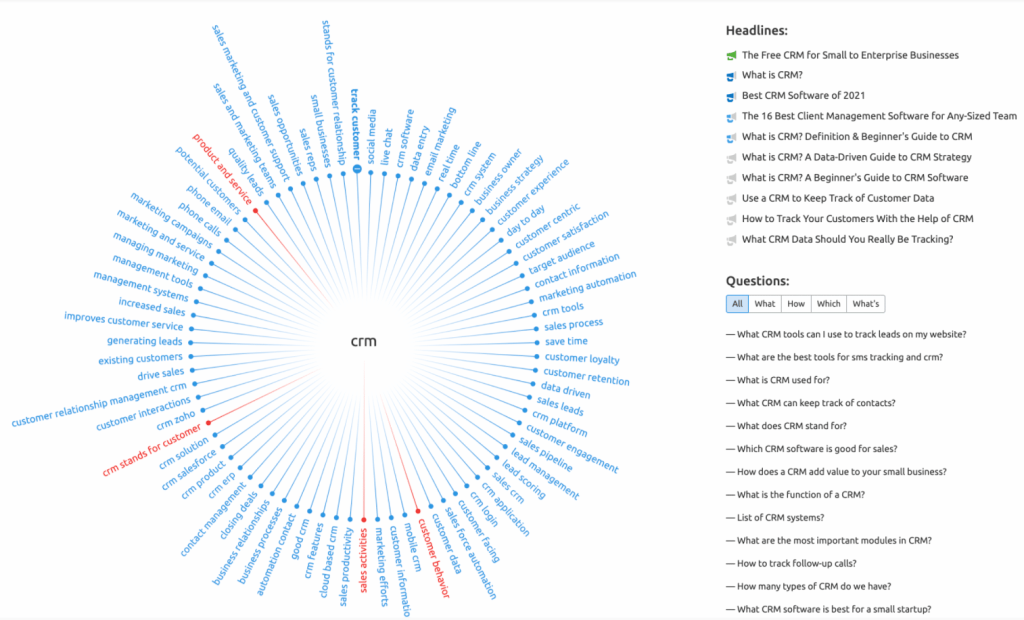
Any CRM company who answers these questions WILL increase their organic search, rankings for important keywords and attract relevant traffic to their website.
What Are the Most Important Keywords?
Our first move with any new client is identifying the most important keywords in their industry that demonstrate buyer engagement or curiosity.
A keyword analysis also helps us gauge the origin of each company’s search traffic. SEMrush pulls keywords for us that buyers are searching for. Taking some of the CRM software companies in the middle of the pack in terms of organic search traffic, we see that there isn’t as much keyword overlap as you might expect:
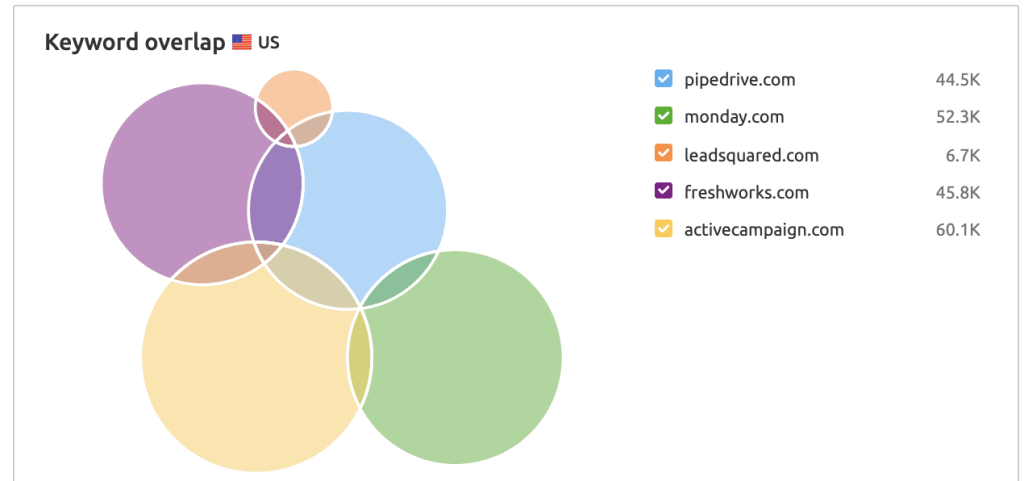
This analysis also tells us what the biggest opportunities are for winning the organic search battle. For Pipedrive, for example, “customer lead management” and “sales contact management” are 2 big opportunities. A steady flow of content on these topics could deliver huge gains in organic search traffic and rankings.
We also look at keywords where a brand ranks on the 2nd page but higher than the competition. We also rank these keywords by CPC, assuming this is a proxy for conversion. Following our example for Pipedrive, “software sales CRM,” “sales CRM,” and “pipeline CRM” are big content marketing opportunities.

We also analyze the brand related and non-branded keywords for each brand. Getting 100% of your traffic from brand search means that you are only attracting the people who already know who you are.
In order to grow, you need to attract visitors who have never heard of you! That’s the power of content marketing: to reach, engage, convert, and retain buyers you would have never reached if all you did was talk about yourself.
No matter the rankings of each CRM business, understanding their position in the following keyword research could help each company effectively reach their target audience, increase sales, obtain quality leads, improve ad campaigns, and build brand awareness.
The top 3 companies that have the highest number of non-branded related keywords are Zendesk, HubSpot, and Salesforce. Well done!
The businesses that struggle with attracting visitors from non-branded keywords are Insightly, LessAnnoyingCRM, LeadSquared, Nimble, Microsoft Dynamics, Nutshell and SugarCRM.
These companies would benefit the most from a strategic content marketing program. The rest of the key players lie in the middle and could utilize content marketing to stand out among their competition.
How Many Keywords Are the CRMs Ranking for and What Is It Worth?
As you can see from the graph below, the companies that are driving the most keywords Zendesk, HubSpot, Salesforce, Zoho and ActiveCampaign.
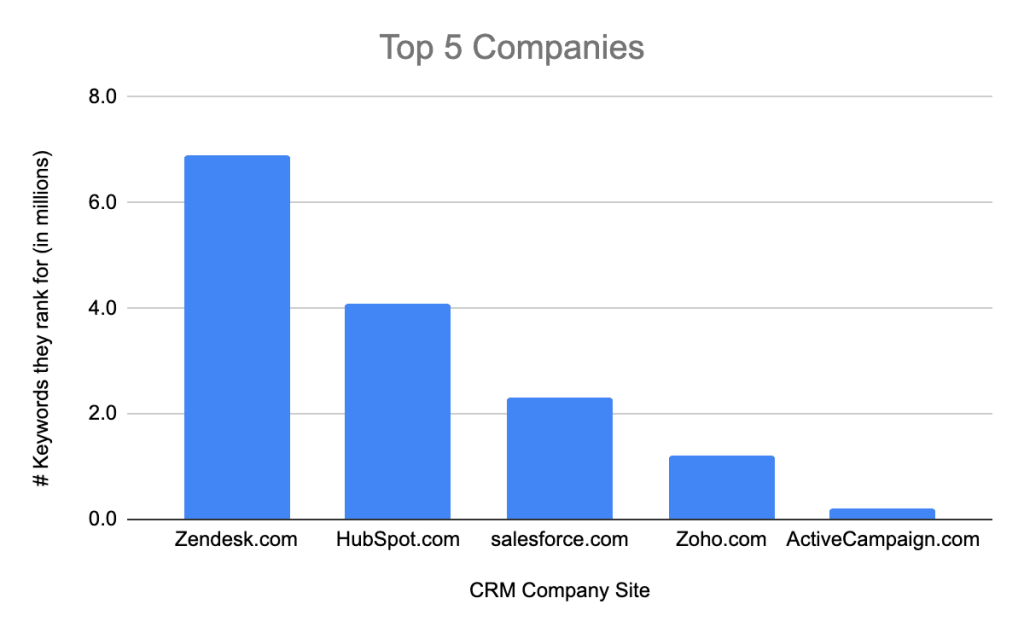
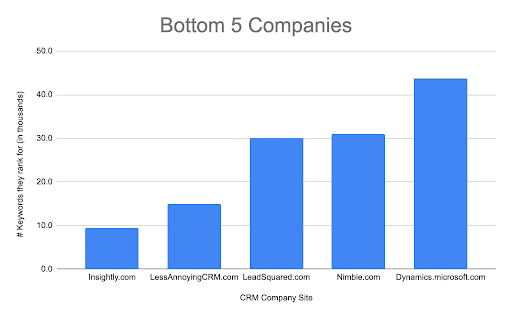
CRM Company Backlink Analysis
Backlinks are extremely valuable for search engine optimization because they represent a “vote of confidence” from one site to another. Ultimately, backlinks to your website are a signal to search engines that others vouch for your content.
Good content leads to more backlinks. The more backlinks a site has, the better its site authority, traffic, and rankings are.
The best way to build external links is to earn them through thought leadership, engaging brand storytelling. and original research. We also help our clients build links through guest posting.
Many CRM SaaS tools have links from other blogs to their blog pages / top performing pages. And you can see the correlation between a high number of backlinks, domains, and authority score.
| Site | # of Total Backlinks | # of Referring Domains | Authority Score |
| Zendesk.com | 750.9M | 265.6K | 87 |
| HubSpot.com | 137.8M | 219.4K | 80 |
| Salesforce.com | 33.9M | 151.5K | 81 |
| Zoho.com | 22M | 126K | 77 |
| Freshworks.com | 3.2M | 16.1K | 68 |
| ActiveCampaign.com | 2.9M | 26.4K | 68 |
| SugarCRM.com | 1.2M | 15.4K | 65 |
| Pipedrive.com | 829.5K | 10.8K | 63 |
| Monday.com | 551.7K | 12.9K | 63 |
| Nimble.com | 531.6k | 5.3K | 59 |
| Dynamics.Microsoft.com | 434.3K | 9.5K | 93 |
| Keap.com | 264.6K | 6.5K | 57 |
| Nutshell.com | 191.7K | 2.6K | 52 |
| Insightly.com | 166.7K | 6K | 60 |
| LeadSquared.com | 25.5K | 2.3K | 53 |
| LessAnnoyingCRM.com | 16.3K | 1.3K | 45 |
CRM Software Company Content Engagement
We used Buzzsumo to determine how often a sampling of these brands are publishing content and how well that content sees engagement relative to each other.
- The average article published received just 11 social engagements. (Marketing Insider Group averages 85)
- Only 2 of the CRM software companies we analyzed published “what” and “why” articles which make up a large percentage of the search queries in CRM
- There was a steep decline in the content published month to month with very little content published last month
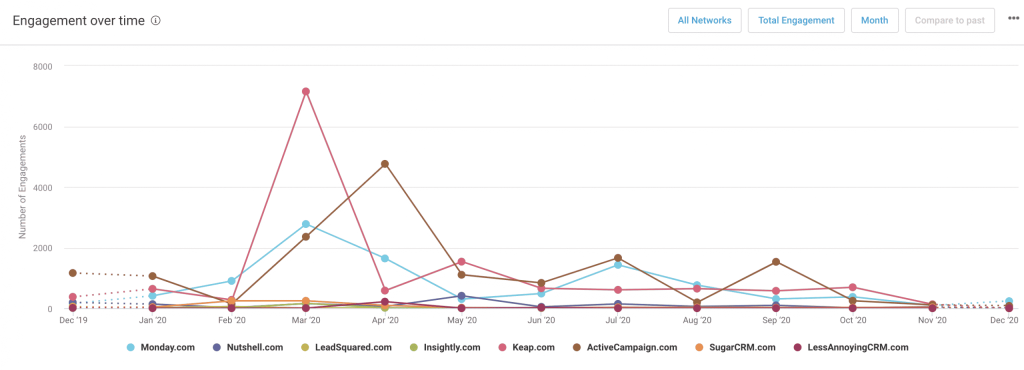
Effective Content Marketing Will Increase Google Rankings
In the CRM segment, content marketing is not just for Google rankings but the entire brand messaging and sales process across all digital channels.
So, you’re a low-performing CRM company in terms of content marketing. What’s next?
We would suggest starting a content marketing program right away. Your goals should be to improve overall rankings in visibility, traffic and engagement by targeting the best keywords, creating content for those keywords, and publishing 1-2 times per week.
Our 7-step content marketing strategy helps you:
- Identify your mission, purpose and goals.
- Understand your audience.
- Establish your content priorities.
- Plan your strategy.
- Create your content.
- Promote your content.
- Track and evaluate your content performance.
That sounds like a lot of work right? Why should you consider this?
Because our clients see an average increase of 138% in organic search after the first year and achieve 7x ROI after 6-8 months.
Outsourcing Content Creation
Maybe you don’t have the time, staff to do this, or budget? Our clients spend only $4,000-$8,000 per month. That’s less than the cost of an event sponsorship and much more effective.
Outsourcing content marketing frees you up to focus on your marketing strategy, on finding the best talent, activating your employees, and showing your executive team the amazing ROI we’re delivering for you.
Choosing a Content Marketing Agency
Choosing a content marketing agency can be a tough feat. Companies can claim that they “do” content marketing, but can they prove ROI?
A content marketing agency, at the very least, should:
- Understand how to attract the right audience
- Provide lead generation and customer acquisition
- Map your customer journey to content
- Focus on building search rankings with content and external links
- Provide basic content promotion services and guaranteed traffic
- Report progress based on pre-decided metrics and KPIs
Of course, we offer all these things and best of all, we love to help our clients measure the success.
So what do you say? Let us help you develop a successful content marketing strategy for your business. Contact us today!






